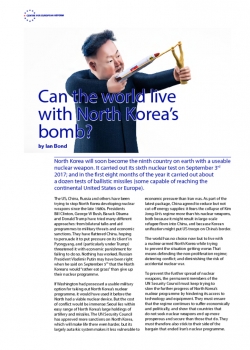
Can the world live with North Korea's bomb?
North Korea will soon become the ninth country on earth with a useable nuclear weapon. It carried out its sixth nuclear test on September 3rd 2017; and in the first eight months of the year it carried out about a dozen tests of ballistic missiles (some capable of reaching the continental United States or Europe).
The US, China, Russia and others have been trying to stop North Korea developing nuclear weapons since the late 1980s. Presidents Bill Clinton, George W Bush, Barack Obama and Donald Trump have tried many different approaches: from bilateral talks and aid programmes to military threats and economic sanctions. They have flattered China, hoping to persuade it to put pressure on its ‘client’ in Pyongyang, and (particularly under Trump) threatened it with economic punishment for failing to do so. Nothing has worked. Russian President Vladimir Putin may have been right when he said on September 5th that the North Koreans would “rather eat grass” than give up their nuclear programme.
If Washington had possessed a usable military option for taking out North Korea’s nuclear programme, it would have used it before the North had a viable nuclear device. But the cost of conflict would be immense: Seoul lies within easy range of North Korea’s large holdings of artillery and missiles. The UN Security Council has approved more sanctions on North Korea, which will make life there even harder, but its largely autarkic system makes it less vulnerable to economic pressure than Iran was. As part of the latest package, China agreed to reduce but not cut off energy supplies: it fears the collapse of Kim Jong-Un’s regime more than his nuclear weapons, both because it might result in large-scale refugee flows into China, and because Korean unification might put US troops on China’s border.
If US had usable military option for taking out #NorthKorea nuclear programme, would have used it before
The world has no choice now but to live with a nuclear-armed North Korea while trying to prevent the situation getting worse. That means defending the non-proliferation regime; deterring conflict; and diminishing the risk of accidental nuclear war.
To prevent the further spread of nuclear weapons, the permanent members of the UN Security Council must keep trying to slow the further progress of North Korea’s nuclear programme by hindering its access to technology and equipment. They must ensure that the regime continues to suffer economically and politically, and show that countries that do not seek nuclear weapons end up more prosperous and secure than those that do. They must therefore also stick to their side of the bargain that ended Iran’s nuclear programme. The Trump administration must stop looking for ways to declare Iran in breach: if the deal breaks down, proliferation risks will increase.
But defending the non-proliferation regime will not take away North Korea’s weapons. Pyongyang must therefore be deterred from using them. When two parties have nuclear weapons, deterrence works as long as each believes that the other might use their weapons in some circumstances, and that both would suffer catastrophic damage. If one side stops believing that, it might risk (for example) a major conventional attack in order to achieve a quick victory, expecting that even in extremis the other would not go nuclear. The US and its allies must be strong enough to make a quick conventional victory impossible; and must show that if Pyongyang tried to blackmail them by threatening a nuclear first strike, they could and would respond. The US is sending this message by maintaining strong forces in and around South Korea and flying nuclear capable aircraft in the area.
#China fears the collapse of #KimJongUn regime more than his nuclear weapons
On the other hand, there is a risk that steps to reinforce deterrence are mistaken for preparations for a pre-emptive strike. If there is one thing worse than North Korea having nuclear weapons, it is a situation in which the United States and North Korea misunderstand each other’s military activity. The two have very few bilateral contacts. But nuclear powers need to know when to worry and when to stay calm. In the Cold War, even though a US-Soviet hotline had operated since 1963, the Soviet Union still came close to confusing a NATO nuclear command-post exercise in 1983 with a pre-emptive strike.
To diminish the risk of nuclear conflict occurring as a result of such misinterpretations, the US (and ideally other nuclear powers) should propose informal discussions on nuclear issues to the North Koreans. The US has had several similar dialogues with China over more than a decade, led (among other organisations) by the Center for Strategic and International Studies and the US Naval Post-Graduate School. They involve think-tankers and officials, but are not inter-governmental talks, allowing participants more freedom to speak. According to the US Institute for Defense Analyses, over an extended period they have given the US and China a better understanding of each other’s “motivations, roles and missions, doctrine, strategy, posture [and] readiness”.
Not talking will not make #NorthKorea weapons go away; just increases risk of accidental Armageddon
It will be anathema to many current and former US officials to ‘reward’ North Korea with such talks; and getting an inevitably suspicious North to engage in them may take a very long time. But not talking will not make Pyongyang’s weapons go away; it just increases the risk of accidental Armageddon.
Ian Bond is director of foreign policy at the Centre for European Reform.

